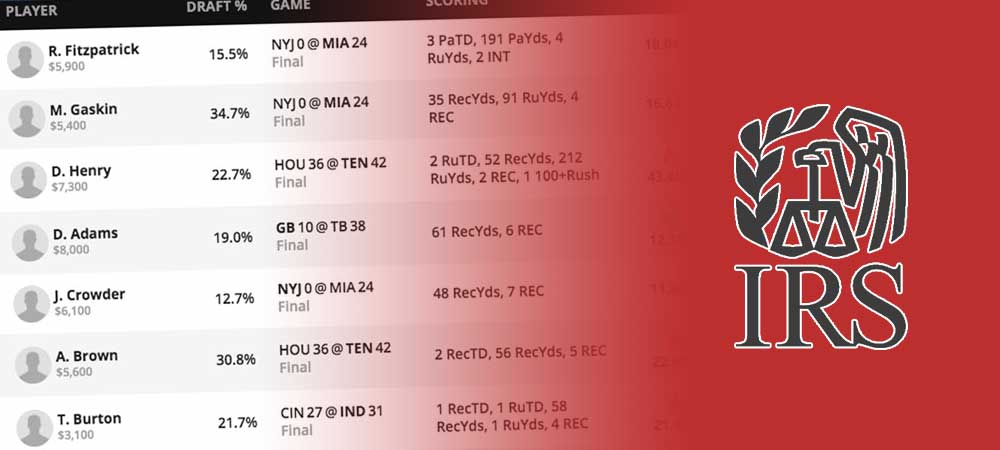- The IRS has ruled that DFS contests are games of chance and not games of skills which means they are taxable as they would be considered a form of gambling.
- If the IRS does get the backing it needs to tax the market, they could see millions of dollars annually in taxes collected from the daily fantasy sports businesses.
WASHINGTON – The fanbase for daily fantasy sports (DFS) continues to grow and the Internal Revenue Service (IRS) has not only noticed the rise of interest in the industry, they are now trying to get in on that action themselves.
Players of DFS don’t gamble in the obvious sense of the term as they’re not putting down any specific wagers, instead, paying entry or contest fees to participate in the chance at winning a large payout.
However, in the last four months, the IRS has issued memos trying to get the DFS market to be seen as a game of chance and not one of skill so that it would have to abide by the same rules as all other gambling industries and be taxed as such.
Second Times A Charm?
In August, the IRS wanted to place an excise tax of 0.25% on the fees collected by the DFS. This market brings in an estimated $4 billion in yearly handle which would make the excise tax come in at over $10 million every year.
Of course, this discussion was nothing more than a discussion, and no such taxes were put upon the daily fantasy sports industry.
With no green light on that idea, fast forward two months later and similar ideas are being discussed again. Rather than suggesting another type of tax like that of the excise tax, the IRS is now wanting DFS to be coupled into the same category as all other gambling and as such be subjected to the same tax requirements.
Fees would be seen as “wagers” and be taxed like any other bet that a game of chance is because DFS is in fact a game of chance according to the IRS.
“DFS transactions meet the definition of wager as interpreted by the Tax Court and State courts because there is an uncertain event (such as the live performance of individual players), winnings if the event resolves in participant’s favor, and consideration is lost if the event does not resolve in participant’s favor. Each DFS transaction is a pay to play competition with predetermined winnings for a certain number of participants. The outcome of the competition turns on the overall statistical performance of live professional players assembled into the fantasy team. The winning participant receives a return of his or her initial bet along with wagering gains, while the losing participant walks away empty-handed. This is consistent with the courts’ interpretation of the term wager,” read the latest memo issued by the IRS.
This subject has been a continued back and forth for some time. It gets even murkier when the topic of taxable deductions comes into play. When filing taxes, any gambling losses can be listed as a deduction.
DFS losses have been something that is often listed by players on their returns. But the IRS says these losses are only deductible when they’ve been taxed from the start. Otherwise, they do not apply.
In this case, it would mean that DFS needs to be taxed in some way, shape, or form if those that engage in the activity want to deduct their losses come tax season.
The Outlook For A DFS Tax
DFS operators and other legislators in states with daily fantasy sports believe that their argument of the game being one of skill and not of chance is solid. It has gotten them this far, after all.
And it’s true that DFS players need to be knowledgeable and have some sort of skillset to be remotely successful at playing the game. But now, the IRS is firing back that DFS is much like poker where skills are required but outcomes are unknown, making the game a gamble.
Should that viewpoint take precedence over the operators’ “game of skill” angle, DFS businesses could very well see taxes coming to them in the near future.
Advertising Disclosure
In order to provide you with the best independent sports betting news and content LegalSportsBetting.com may receive a commission from partners when you make a purchase through a link on our site.
News tags: Daily Fantasy Sports | DFS | Excise tax | fantasy sports | Games Of Chance | Games Of Skill | IRS | taxes

Christina has been writing for as long as she can remember and does dedicated research on the newly regulated sports betting market. She comes from a family of sports lovers that engage in friendly bets from time to time. During the winter months, you can find Christina baking cookies and beating the entire staff at Mario Kart…the N64 version of course.


 Bitcoin Sports Betting Sites
Bitcoin Sports Betting Sites Best Online Sports Betting
Best Online Sports Betting Famous Sports Bettors
Famous Sports Bettors States With Legal Sports Betting
States With Legal Sports Betting Sports Betting Events
Sports Betting Events




